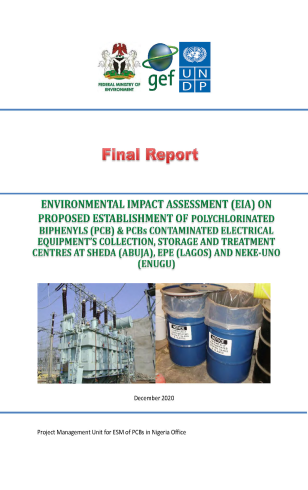Environmental Impact Assessment on Proposed Establishment of Polychlorinated Biphenyls and PCBs contaminated electrical equipment collection, storage and treatment

Environmental Impact Assessment on Proposed Establishment of Polychlorinated Biphenyls and PCBs contaminated electrical equipment collection, storage and treatment
June 8, 2023
Polychlorinated Biphenyls (PCBs) have been used in almost all sectors of the Nigerian economy as coolants and insulating fluids in transformers and capacitors in electricity generation, transmission and distribution, in flexible coatings of electrical wiring and components. PCBs are among the most toxic Persistent Organic Pollutants (POPs) listed in the Stockholm Convention, which calls for the elimination and/or phasing out of 12 POPs, called the "dirty dozen".
Nigeria, in line with Stockholm Convention on POPs which obliges parties to eliminate the use of PCBs in equipment by 2015, and to make concerted efforts for disposing liquid PCBs and equipment through environmentally sound waste management practices as early as possible, submitted its National Implementation Plan (NIP) in 2009 listing twenty-three areas of action as priorities for meeting its treaty obligations. One of the areas of action is to establish PCBs Interim Storage Facilities (PCB-ISF) at Sheda (FCT), Epe (Lagos) and Neke Uno (Enugu).
Therefore, this Environmental Impact Assessment (EIA) report has been prepared for the proposed facilities as required by the EIA Act.

 Locations
Locations